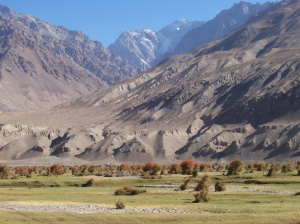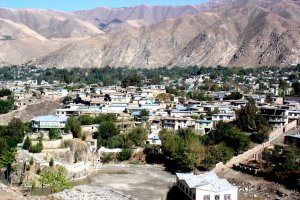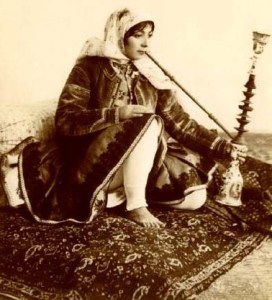I have been asked for some background to a recent post, A Blast From The Past. What was I doing in Afghanistan in the first place?
____________________________________________________________________
Although I am not a biologist I went on a biology expedition to Afghanistan as medical officer, which involved training before we left in setting broken legs with splints and injecting innocent oranges with water. All good fun, but what would have been more useful was learning how to deal with problems of the digestive system. To better earn my keep I supplemented the bandages and syringes with a small study of music in the Badakshan province, my equipment being ears, a tape recorder and manuscript paper.
Badakshan province is in the far north east of Afghanistan and much of it is mountainous, including part of the Hindu Kush. This is a photograph of the provincial capital, Faizabad.
To get to our destination we travelled overland in an ex-army K9 truck through Greece, Turkey and Iran, and took the same way back. Since I did not then have a camera all I have to offer are a few verbal snapshots supplemented with images from the web. I do not claim to be a latter-day Freya Stark.
Men with guns
We were rounded up by a unit of Turkish army and removed to a low building with small, glassless windows. We spent the night there, a soldier with a rifle at each window. They were worried we might be taken out by Kurds. We had seen quite a few, many on horseback, but they had always ignored us.
A café in Herat
A waiter had hung his pencil on the wall. Suddenly I noticed that the wall was swaying from side to side about the pencil, which remained pointing towards the floor. I thought I was losing it and took a little too long to hit the street. From memory, the earthquake was centred near Mashad in Iran.
A quiet game of chess
We sat on a rug under a tree. I used to play chess, and even defeated a reverend once in a competition, but this time my strategy was different. If the Afghan was better than I was, then I would lose and we would both be happy. If he was not a good player, I would have the difficult task of engineering a loss without making it obvious what I was doing. That way we would both be happy too. On no account would I use the en passant rule in case it was not known in these parts. I had no wish to be accused of cheating. The game took quite a while, during which I ate the occasional grape while some of my colleagues resorted to deep draughts from a hookah.
I find it amusing that the current craze for e-cigarettes uses vapour – exactly what the hookah has been doing in its various forms for some four hundred years.
A game of volleyball
Challenged to a game of volleyball by the Afghan army, engineering a loss was not necessary. We didn’t stand a chance.
Checking Shoes
We checked them every morning before putting them on to make sure they weren’t occupied by scorpions.
The baker
I still remember the grim look on the his face when, for the third night running, our lead biologist with his advanced technology failed to trap any of the rodents raiding his mill.
Losing a gear
When our truck lost its reverse gear a local mechanic managed to fix it. Our problem then was to avoid offending him – either by offering him too little or too much money. What local mechanics managed to do with limited tools was amazing. They were particularly good at keeping fire-arms in working order, a fact foreign invaders might have taken into account.
Ceremonial tea
On several occasions we were invited to join village elders in large tents, where we were offered tea and unleavened bread. We knew drinking the tea might be risky, but refusing to drink it more so. The custom was to sit round the edges of the tent on carpets and rugs. We did what we could to communicate using hand gestures. All of the people we met on these occasions were men.
An old man and a donkey
I met several old men in Afghanistan, but had to remind myself that these were the ones who had survived disease and ill health. Many had not.
I have a clear memory of one in particular. We were making our way along a path about two feet wide. The path was half way up a ravine, raging water below and high cliff above. Stepping aside for someone coming the other way was dangerous, and this particular old gent was not only coming the other way but had a donkey with him. He produced a bag of dried mulberries from his flowing sleeve and offered us some. Very civil of him, I thought at the time, as I tried to take a few without plunging into the torrent below. He hit us with the usual greeting, which we returned. As I remember it, this was ‘burubachai’, but I recently found out I had mis-remembered some Serbian I used to know, so maybe I have this wrong too.
Music
Most of the music I heard took the form of songs accompanied by small stringed instruments. The songs were strophic, and a given song sometimes had quite a few verses. I was told by a passing group of US anthropologists that the subject matter was usually patriotic. Add this to the local ability to make and repair weapons and Afghanistan is a place only an idiot would think of invading.
I recorded quite a few of these songs, but the recordings were taken back to the UK when I was in hospital in Belgrade and I have not been reunited with them since. Something else I learned was that women had music of their own, but always played it in their own homes. Not being a woman myself, there was no possibility of eavesdropping on this music, let alone recording it.
Note 1
The present Kurdish problem has been caused by the arrogance of diplomats during the First World War, who thought it was alright to draw invisible lines in the sand and deny the Kurds a homeland of their own, splitting them up between Turkey, Iraq, Iran and Syria – a problem which persists to this day. Check out Sir Mark Sykes, Monsieur François Georges-Picot and their secret agreement of 1916.
Note 2
Readers of a musical tendency might like to know that the songs I recorded were in the mixolydian mode. This mode is not far removed from our major diatonic major scale except that the seventh degree is flattened. So if the major scale was C major, then instead of a B natural we have a B flat (Bb). Thinking in terms of chords, Vaughan Williams might use this Bb as part of a G minor chord, whereas Carl Nielsen would surely have used it as part of a Bb major chord. Isn’t life fun?




Yes, I too was intrigued by the reference to Afghanistan and thought you must have a fascinating life. Especially when coupled with Belgrade, Serbia. I imagined you to be a spy or at least a member of the Foreign Legion. But that seems to be a bit of a stab in the dark when I also take in your love of music. I could be a bit pre-judiced. I mean why can’t a spy or Foreign legion fighter love music? Are they exclusively the domain of those that lead hum-drum lives and are pacifists?
It is all so difficult.
A good article though. I loved those snippets of your past. Keep them coming.
LikeLiked by 1 person
No doubt a musical spy would find a way of concealing micro-film in note heads, but I have never been spy material. Not all music-lovers are hum-drum though. How about Carlo Gesualdo, ‘Italian nobleman, lutenist, composer and murderer’?
LikeLike
Brilliant Rod, what a fascinating life you’ve had, have, you never cease to amaze me, I look forward to you sharing more 🙂
LikeLike
Well, i’m going back a bit here, Linda. In recent years my travels have mainly been between the ears.
LikeLike
This is fascinating stuff. I see you came to the same conclusion as Kipling, that only idiots mess with Afghanistan. You have so much to draw on in your writing, both in terms of experience and expertise. Keep writing!
LikeLike
Yes, Kipling was right, especially when you add the terrain to the things I mentioned in the post.
Unlike a friend of mine, I do not have it when it comes to autobiography, so I may keep writing but there will be very few posts like this.
LikeLike
What an interesting list of activities. Eventually, I suppose they’ll get back to this. Nicely done, Rod.
LikeLike
I think you’re referring to the Afghans here, but if you look at pictures of Afghan students from the 50s you will see many happy girls who were then under no pressure to go around covered in portable tents. It will take a long time to return to those happy days.
LikeLike
Checking the shoes brought back memories of my world trip to always shake out my boots in the morning. Still do it, especially when I go into the corral to put on the wellies to attend to the chickens. Did you see that Tony Benn video, ‘why are we in Afghanistan again?’ If not, let me know as I posted it on one of my other blogs. ’’Twas very good.
LikeLike
I haven’t seen it, didn’t know it existed. How many blogs have you got?
LikeLike